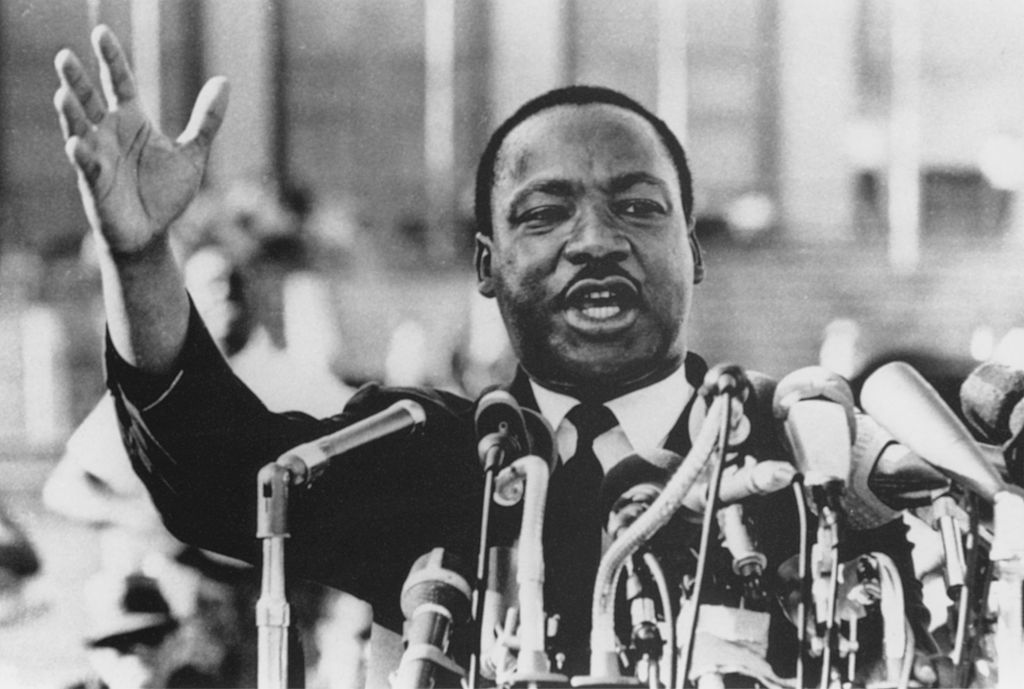
- Film
‘MLK/FBI’ and the Long History of Targeting Black Activists
MLK/FBI is the first film to uncover the extent of the Federal Bureau of Investigations’ surveillance and harassment of the reverend Dr. Martin Luther King, Jr. throughout his life by using some “dirty” tactics that are shocking especially perhaps given the way Hollywood movies have glamorized the FBI in several fictionalized features.
The documentary was produced quite fast. The majority of interviews, with Beverly Gage, Donna Murch, Clarence Jones, and Andy Young, were conducted in the fall of 2018. The editor started screening the footage in November 2019, and the premiere took place less than a year later. After premiering at the Toronto Film Festival and playing at the New York Film Festival, the feature was acquired by IFC, which will release the film on January 15, this year’s MLK Day.
Featuring interviews with key cultural figures, including former FBI Director James Comey and film historian Beverly Cage, and politician Andrew Young, the film is based on newly discovered and previously declassified files. Utilizing a trove of documents obtained through the Freedom of Information Act and unsealed by the National Archives, the documentary explores the government’s history of targeting Black activists.
Veteran director Sam Pollard, perhaps better known as editor of some of Spike Lee’s earlier films, revisits his previous work. He worked in 1988 on Eyes on the Prize, and one episode, titled Two Societies, followed Dr. King as he was bringing the movement from the South to the North, and the hostility he faced along the way. Two years ago, producer Benjamin Hedin reached out to Pollard with the idea of making a new documentary, sort of a companion piece that would continue to probe the contradictions in terms of how King is perceived today versus his perception in the past. Beverly Gage mentions a popularity poll taken after King and Hoover met – the only time this happened – and the results indicated that Hoover was much more popular than Dr. King. Of course, perceptions are politically conditioned and thus change with the zeitgeist. Most people forget that trend, because at present, Hoover is looked at as a pariah, but back then he was deemed a genuine American hero.
It’s always interesting to learn the true story behind organizations like the FBI, which has become mythically heroic, partly due to such Hollywood pictures as the 1935 G Men, starring James Cagney (switching from playing gangsters to lawmen), and Mervyn LeRoy’s 1959 The FBI Story, starring the all-American Jimmy Stewart.
The new chronicle is strong in providing both information and socio-political context. It examines the complexity and the accuracy of the American landscape in terms of the federal government’s actions. It is a known fact that the FBI spied on Dr. King (at one point described as “the most dangerous man in America”), but the feature dives deeper into this subject than other works.
Some of the documents collected by the Congressional committee investigating assassinations had to be unsealed. Because they investigated both Kennedy and King’s assassinations, when documents were released about one, there’s always the other. There was no way to know in advance what was contained in the 2017-2018 declassifications.
The new materials reveal a lot about the informants and how Dr. King was followed for most of his later life. There were allies in the movement who tipped off FBI agents about King’s plans, and the new discoveries make it plain how coordinated and vast the bureau’s sources were. For instance, on the night of his death, they were not even tapping his phones anymore, because they already had such good informant coverage. Even so, given Hoover’s personal and suspicious motives, the filmmaker and his team never took anything that was in the declassified files, at face value. They always raised questions of the sources, where the files came from and why they were there.
It is interesting to realize that Dr. King wasn’t always the “Great Man,” loved and embraced by the American public. This chronicle emphasizes that King was not a “perfect” man, that he was not a monogamous man, that he was a human being, just like everybody else. Hence, it includes the rape allegations, in order to make sure that all sides of this story were represented. Was Dr. King complicit in whatever went on in that room? Why would the FBI not go in and interrupt the action if they knew that a woman was being raped? It begs many questions, but the information is out there and had to reported. Trying to be both serious and fair, the filmmakers decided to include it in a responsible way, as part of the larger picture.
When Gage talks about the First Amendment, the importance of protesting, she speaks directly to what’s happening in the streets of America today. Indeed, the documentary is extremely timely and relevant with the Black Lives Matter movement and the protests after the murder of George Floyd and the horrific murders that are taking place in this country.
Telling a story that’s both illuminating and tragic, MLK/FBI bears searing relevance to our current moment. The film ends on a poignant note, wondering how the public will react to the wiretap recordings of King by the FBI, which are set to become public record in 2027.

